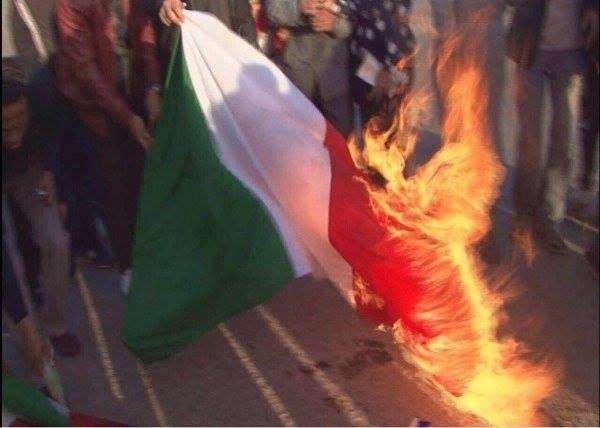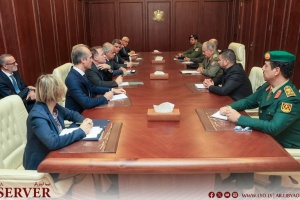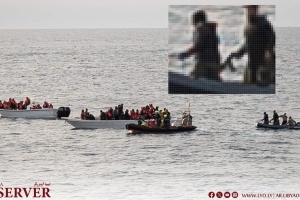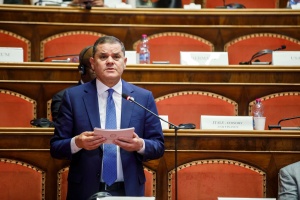By Abdelkader Assad, freelance journalist
Libyans say no to Italy but yes to the rest of the world

Now as never before, the wounds of the Libyan people started aching in reminiscence of the old bad days. It is Italy, the wounds echoed for some and we have to reject unstitching them in all means possible.
This soliloquy was said by almost every Libyan after they received the shocking news that Italian Senate of the Republic and Parliament voted in favor of sending a naval mission into the Libyan territorial waters.
Of course, the buzz got tense with the arrival of one Italian warship by the name of Comandante Borsini in the Libyan capital's Abu Sitta Naval Base, where the Government of National Accord's (GNA) command has been located.
Flash Back on Colonial Times
Libya was an Italian colony from 1910s to 1947 and the Libyan people had suffered for certain from different kinds of painful treatments by the colonizers, and thus the old men and women in Libya have passed their experiences to the new generation.
Public and Official Condemnation
Several Libyans took to the streets in Algeria Square in Tripoli and in Martyrs Square in Tobruk as well as in Benghazi and other cities to protest and condemn the Italian naval mission that arrived in the Libyan waters.
The protesters called on the Government of National Accord (GNA) to step down if they are not capable of protecting Libya's sovereignty, chanting the slogan "Libya is not the fourth beach of Italy."
Some protesters in the eastern Libyan city of Benghazi burned the Italian flag in the public square in an outrageous reaction to what they called "violation of Libya's sovereignty."
GNA has not stated any official response to the protests amid more condemnation of the Italian naval mission in Libya's territorial water.
Eastern Libyan parliament in Tobruk rejected the deal between the GNA's Prime Minister, Fayez Al-Sirraj and Italy, while the commander of the eastern forces of Operation Dignity, Khalifa Haftar, ordered his air force and naval force troops to bomb any foreign vessels in the Libyan waters except the commercial ones.
Meanwhile, the Italian Embassy in Libya said there are no huge protests in Tripoli, in an attempt to downplay the condemnation of Libyans toward Italy's violation.
"Italy is keen on helping Libyan people to get out from their crisis." Italian Embassy tweeted on Friday.
Libyans Said Nothing to France's Intervention
Late in July, the French President, Emmanuel Macron, brokered an agreement between the eastern commander of the self-styled Libyan National Army (LNA) and the UN-backed Government of National Accord's PM, Fayez Al-Sirraj. The two announced, under the auspices of France, a joint declaration that above all set the date for upcoming elections in Libya and a ceasefire in the entire country.
No condemnation by activists or officials or protests in the streets were seen neither in eastern nor in western regions of the country – not even in the southern region or from officials in the eastern government, which means that the Libyans are OK with France meddling in their affairs, but not Italy; the historical enemy.
NATO, US, Russia, UAE, Egypt
Likewise, the case seems to apply to every intervention taking place in Libya since the February revolution of 2011, when the NATO bombed Libya and many hailed it, then throughout the years from 2014 to present when UAE and Egyptian warplanes helped toughen the grip of Haftar in the eastern region, especially in Benghazi, not to mention the Russian aid that has been reported several times in many news and media reports.
Yet not so long ago, the US intervention alongside Al-Bunyan Al-Marsoos Operation – an alliance of forces from Misrata city and other districts under the command of GNA – to defeat ISIS in Sirte was more hailed than condemned or deplored as was the latest Italian move, which Italy said aimed at helping Libyan coastguards and naval personnel combat illegal immigration and human traffickers.
The question however is whether the Libyan condemnation of the Italian naval mission in the Libyan waters is driven by sovereignty sentimentalists, patriots, politicians or just by propagandists.
Disclaimer: The views and opinions expressed in this article are those of the writer, and do not necessarily reflect those of the Libya Observer







